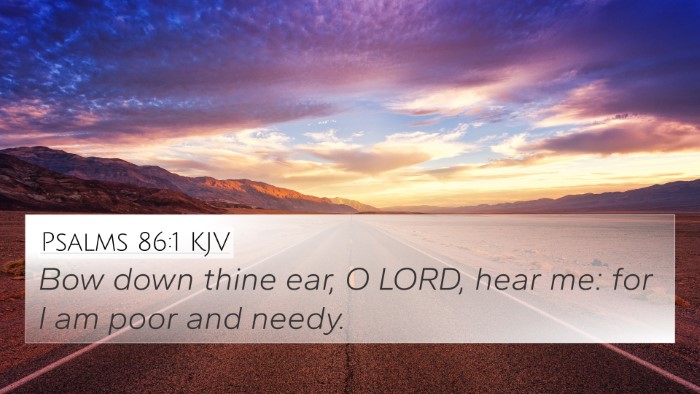Old Testament
Genesis Exodus Leviticus Numbers Deuteronomy Joshua Judges Ruth 1 Samuel 2 Samuel 1 Kings 2 Kings 1 Chronicles 2 Chronicles Ezra Nehemiah Esther Job Psalms Proverbs Ecclesiastes Song of Solomon Isaiah Jeremiah Lamentations Ezekiel Daniel Hosea Joel Amos Obadiah Jonah Micah Nahum Habakkuk Zephaniah Haggai Zechariah MalachiHabakkuk 3:1 Similar Verses
Habakkuk 3:1 Cross References
A prayer of Habakkuk the prophet upon Shigionoth.
Uncover the Rich Themes and Topics of This Bible Verse
Listed below are the Bible themes associated with Habakkuk 3:1. We invite you to explore each theme to gain deeper insights into the Scriptures.
Habakkuk 3:1 Cross Reference Verses
This section features a detailed cross-reference designed to enrich your understanding of the Scriptures. Below, you will find carefully selected verses that echo the themes and teachings related to Habakkuk 3:1 KJV. Click on any image to explore detailed analyses of related Bible verses and uncover deeper theological insights.

Psalms 7:1 (KJV) »
O LORD my God, in thee do I put my trust: save me from all them that persecute me, and deliver me:
Habakkuk 3:1 Verse Analysis and Similar Verses
Understanding Habakkuk 3:1
Habakkuk 3:1 states: "A prayer of Habakkuk the prophet, upon Shigionoth." This verse serves as an introduction to a profound prayer that combines fervent supplication with a deep sense of worship and reflection upon God's past actions and future promises.
Verse Meaning and Context
In this prayer, Habakkuk employs a poetic form that emphasizes emotion and intensity. The term "Shigionoth" is believed to refer to a type of musical or poetic structure, indicating that this prayer may have been meant for worship or collective singing.
Commentary Insights
-
Matthew Henry's Commentary:
Henry emphasizes that Habakkuk's prayer reflects both his longing for God's intervention and his awe at God's majesty. He notes that this request is set within a context of remembrance of God's historical acts, conveying both fear and trust in God's sovereignty.
-
Albert Barnes' Notes:
Barnes explains that Habakkuk's prayer is inherently a call for revival and displays the prophet's role as an intercessor. He highlights the importance of prayer in the life of a believer, suggesting that genuine prayer arises from a troubled heart seeking divine solace and strength.
-
Adam Clarke's Commentary:
Clarke provides insight into the significance of the term "Shigionoth," which indicates that this prayer may also possess a deep lyrical quality. He emphasizes that Habakkuk's prayer is characterized by both emotion and reason, recognizing the necessity for believers to articulate their struggles and praises to God.
Theological Significance
Habakkuk 3:1 serves not only as a personal lament but as a communal cry for spiritual awakening. The act of praying reflects a connection to God that is vital for sustaining faith, especially in times of uncertainty and distress. By contextualizing his prayer within a musical form, Habakkuk underscores the importance of worship in expressing the human experience of faith.
Related Bible Cross-References
- Psalm 61:1-2: "Hear my cry, O God; attend unto my prayer. From the end of the earth will I cry unto Thee, when my heart is overwhelmed."
- Jeremiah 29:12: "Then shall ye call upon Me, and ye shall go and pray unto Me, and I will hearken unto you."
- Philippians 4:6: "Be careful for nothing; but in everything by prayer and supplication with thanksgiving let your requests be made known unto God."
- James 5:16: "The effectual fervent prayer of a righteous man availeth much."
- 1 Thessalonians 5:17: "Pray without ceasing."
- Luke 18:1: "And He spake a parable unto them to this end, that men ought always to pray, and not to faint."
- Romans 12:12: "Rejoicing in hope; patient in tribulation; continuing instant in prayer."
Practical Application
This verse invites believers to consider the posture of their own hearts when approaching God. Prayer should be both a lifeline in distress and an expression of faith in God's power. The content of one’s prayers may oscillate between praising God for past deliverances and pleading for present help, as demonstrated by Habakkuk.
Exploring Thematic Connections
Cross-referencing Habakkuk 3:1 with other scripture illuminates the breadth of prayer in the Biblical tradition. The formulaic structure of prayer found in this verse resonates with themes present in the Psalms, highlighting the diversity of approaches to communication with God.
Conclusion
In summary, Habakkuk 3:1 encapsulates the essence of a heartfelt cry for assistance wrapped in a framework of praise. As one engages in cross-referencing Bible verses, the connections between imperfect human experiences and perfect divine responses become clear, creating a rich tapestry of inter-Biblical dialogue. Understanding this verse cultivates a deeper appreciation for the importance of prayer and worship within the life of a believer.




